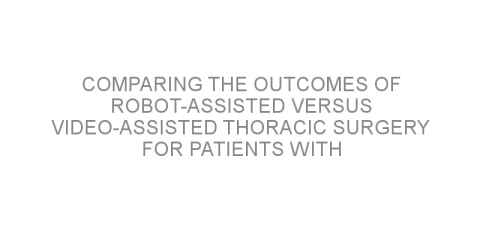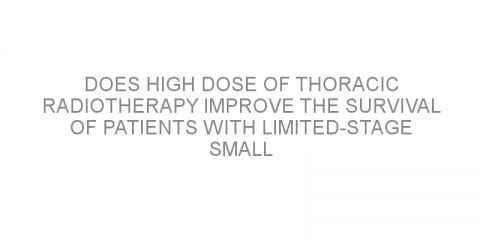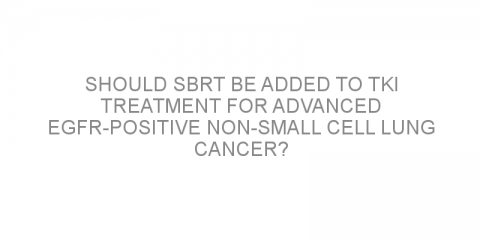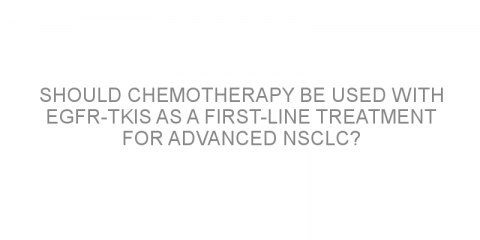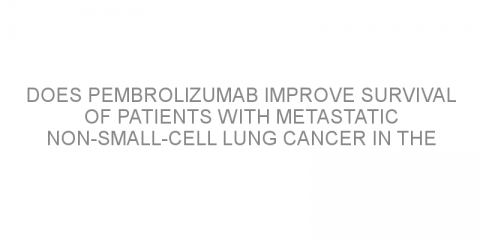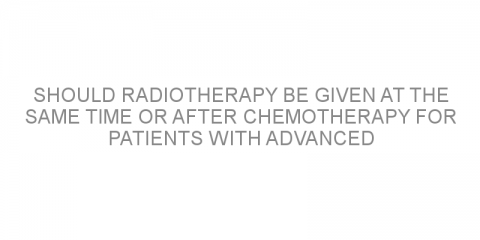In a nutshell The study was carried out to assess the difference in outcomes between lobectomy (LE) and sub-lobar resection (SLR) for older patients with stage I non-small-cell lung cancer (NSCLC). The authors found that both surgeries had similar outcomes in these patients. Some background NSCLC is responsible for 85% of lung cancer diagnoses...
Read MoreLung cancer Posts on Medivizor
Comparing the outcomes of robot-assisted versus video-assisted thoracic surgery for patients with non-small cell lung cancer.
In a nutshell This study compared the short-term and long-term effectiveness between video-assisted thoracic surgery (VATS) and robot-assisted thoracic surgery (RATS) for the treatment of patients with non-small cell lung cancer (NSCLC). The data showed that RATS is a good and safe technique compared with VATS in terms of short-term and long-term...
Read MoreDoes high dose of thoracic radiotherapy improve the survival of patients with limited-stage small cell lung cancer?
In a nutshell The study aimed to investigate the safety, tolerability, and effectiveness of high-dose thoracic radiotherapy for limited-stage (LS) small-cell lung cancer patients (SCLC). The study concluded the high dose of thoracic radiotherapy improved the survival of these patients without increasing toxicity. Some background Lung cancer...
Read MoreShould SBRT be added to TKI treatment for advanced EGFR-positive non-small cell lung cancer?
In a nutshell This trial was carried out to assess the effectiveness of EGFR-tyrosine kinase inhibitors (TKIs) with stereotactic body radiation therapy (SBRT) in advanced non-small-cell lung cancer (NSCLC). The authors found that TKIs plus SBRT improved the survival without disease worsening for these patients. Some background Lung cancer...
Read MoreShould chemotherapy be used with EGFR-TKIs as a first-line treatment for advanced NSCLC?
In a nutshell This review was carried out to analyze the effectiveness and safety of EGFR tyrosine kinase inhibitors (TKIs) plus chemotherapy (CT) versus EGFR-TKIs alone as a treatment for advanced non-small-cell lung cancer (NSCLC) that is EGFR-positive. The authors found that EGFR-TKIs and CT treatment improved survival for these patients while...
Read MoreComparing alectinib to ceritinib treatment for ALK-positive non-small-cell lung cancer that failed after crizotinib treatment
In a nutshell This study compared the effectiveness of ceritinib (Zykadia) and alectinib (Alecensa) in patients with ALK-positive non-small-cell lung cancer (NSCLC) who previously had a crizotinib (Xalkori) treatment failure. The data showed that both ceritinib and alectinib were effective in these patients. Some background Non-small-cell lung cancer...
Read MoreComparing PD-1/PD-L1 inhibitors versus chemotherapy in patients with previously treated advanced non-small-cell lung cancer.
In a nutshell This study investigated the effectiveness and safety outcomes of programmed death-1 (PD-1)/PD ligand 1 (PD-L1) inhibitors versus chemotherapy in patients with previously treated advanced non-small-cell lung cancer (NSCLC). The data showed that PD-1/PD-L1 inhibitors were safer and more effective than chemotherapy in these patients. Some...
Read MoreDoes pembrolizumab improve survival of patients with metastatic non-small-cell lung cancer in the long term?
In a nutshell This study evaluated the long-term effectiveness of pembrolizumab (Keytruda) in patients with untreated metastatic non-small cell lung cancer (NSCLC). The authors showed that pembrolizumab increased the long-term survival of patients compared to chemotherapy. Some background NSCLC accounts for most lung cancers....
Read MoreShould cemiplimab be considered a first-line treatment for advanced non-small-cell lung cancer?
In a nutshell This study aimed to examine the effectiveness and safety of cemiplimab (Libtayo) in the first-line treatment of patients with advanced non-small-cell lung cancer (NSCLC) with a high quantity of PD-L1 protein. The study concluded cemiplimab improved survival of these patients compared to standard chemotherapy. Some background NSCLC...
Read MoreShould radiotherapy be given at the same time or after chemotherapy for patients with advanced non-small cell lung cancer?
In a nutshell This study investigated the effectiveness and safety outcomes of radiotherapy given at the same time (concurrent chemoradiotherapy; cCRT) or after chemotherapy (sequential chemoradiotherapy; sCRT) for the treatment of patients with advanced non-small-cell lung cancer (NSCLC). The data showed that cCRT improved the long-term...
Read MoreCould immune-related adverse events predict the effectiveness of immune checkpoint inhibitors in patients with lung cancer?
In a nutshell This study investigated whether immune-related side effects (irSEs) could predict the effectiveness of immune checkpoint inhibitors (ICIs) in patients with lung cancer. The data showed that the occurrence of skin, hormone, and gastrointestinal irSEs could predict the effectiveness of immunotherapy in these patients. Some background...
Read MoreCan nivolumab plus ipilimumab combined with chemotherapy be used as a first-line treatment for patients with non-small cell lung cancer?
In a nutshell This trial looked at nivolumab (Opdivo) plus ipilimumab (Yervoy) combined with 2 cycles of chemotherapy as treatment for patients with non-small cell lung cancer (NSCLC). The authors found that this combination provided an improved overall survival versus chemotherapy-only regimens. Some background NSCLC is responsible for 85% of...
Read More

